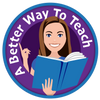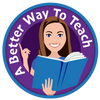The week before exams is brutal for teacher and student alike, so I’ve planned your full week before exams with all the necessary learning, minus games of review Jeopardy that end in screaming matches between students (I’m looking at you, my 5th period class of 2013).

First, let's chat about what matters that week before exams. Whether your students have semester exams, end-of-the-year finals, or end-of-course tests, what matters that week is that students are engaged in meaningful learning while cementing ideas that you’ve worked with throughout the semester.
But also, people be tired.
Your students, (and you), are exhausted and don’t really feel like doing much schoolwork at all. So, it’s got to be fun. But not crazy! Nobody has time for crazy right now. Trashketball is great, until someone’s character is attacked because they might not have been behind the 3-point line throwing that balled up piece of paper.
In light of all of that, each one of my suggestions for your week before exams involves meaningful review, just the right amount of fun, and minimal crazy.
Let’s jump in.
Monday: Use Short Films to Review Lit Terms and Grammar
Short Films and Lit Review
Short animated films are my secret sauce when it comes to review. First, they’re incredibly versatile. You can make them fit nearly any need you have in the English classroom. Secondly, this industry has blown up in recent years. There are so many great films to choose from besides just Pixar shorts.
Here's how to break this thing down:
1.) Pick 2 animated shorts to work with this class period. I love Don't Croak (1:40), Recoiled (8:02), and Paperman (6:02), but there are tons to choose from.
2.) Pick one film to start with, and have your students watch that short film twice. The first time they watch it, they should just watch it--they should enjoy the story. Then, have students look for any literary elements you’ve worked with during the semester.
3.) Have a prepared list of lit. terms for your students to look for in the animated short. If you teach 9th or 10th grade students, have them look for the story arc elements (setting, rising action, conflict, denoument, and resolution).
Students might also look for indirect and direct characterization or round and flat characters. If you want to challenge students, have them consider what techniques the creator used to characterize the person (speech, actions, or something else)?
Other literary elements that students can look for include: symbolism, juxtaposition, flashback, flashforward, suspense, and types of conflict.
4.) Last, challenge your students to make text-to-text connections from any literary works you’ve tackled that semester and to consider the purpose and intended audience of the short film.
I've got this whole review ready to go. It's instantly accessible when you join the English Teacher Vault (find out more about that here)!
Grammar Review With Short Films
After considering literary techniques from the short film, have students watch a different short film (also twice). Then, have them review grammar concepts from the semester. This works for any film!
Here are a few ways you can do this:
- You can have students write a simple, compound, and complex sentence about the film.
- Have students write a sentence about the conflict with 3 action verbs.
- Have students write about the main character using an opening adjective.
- Have students write a sentence about the ending of the film using parallel structure.
If you feel less-than-amazing with the grammar you covered during the semester, grab my full unit on parts of speech to see how teaching grammar can actually be fun!
I’ve used this method of reviewing lit terms and grammar for many years, and it is always a hit.
Tuesday: Listen To A High-Interest Podcast And Have Students Make Connections
Podcasts are a great way to revisit and connect the themes students have examined during the semester. Regardless of what you’ve taught, there’s a podcast out there that will relate.
Listening to podcasts also gives your students a chance to strengthen that active listening muscle that some exams require your students to use.
If you don’t know where to start with bringing in a high-interest, stand-alone podcast, I’d suggest doing an episode of “Imagined Life.” This is a podcast that tells a detailed story of a celebrity or leader in society, but you don’t know who the person is until the end of the episode. There are fun clues along the way, so the listener can attempt to figure it out as they listen.
Man of the lives profiled in this podcast have elements of heroism, overcoming obstacles, standing up to an unjust situation in society, sacrifice, and other themes that you have likely examined in the reading you’ve done with your students.
I’d suggest listening to “The Daydreamer” or “The Traveler” to get a feel for the show. I’ve got a free handout that works with any Imagined Life episode that you can grab here.
If this isn’t necessarily your jam, check out my blog post where I give suggestions for more podcasts that work great in the ELA classroom "Three Podcasts That Work in High School ELA."

Wednesday: Do a Style-Minded Revision
Alright, let’s get philosophical.
For students to actually become better writers, they must learn to revise. And sometimes revision may even come after they’ve already been given a grade because the writing process is never done. "Noooooo!" your students wail. "I turned that in! I'm done with it!"
I know this might be a tough sell, but it's important for students to consider that they can always improve on their writing, and the end of the semester is a good time for them to reflect on how much they've learned and it apply it directly to one piece of writing.
Also, have you ever noticed how motivated kids are at the end of the semester to grab some “extra credit” points? Maybe you give extra credit, or maybe not, but this is a nice time to do that if you want. Alternatively, you can make this another grade.
I would not suggest you spend time actually grading these, but give them a cursory look to see that your students actually revised an essay with style and grammar in mind.
Here’s what students should do:
- Go back to one longer piece they worked on during the semester (essay, narrative, or longer response piece).
- Revise it with an eye for style and grammar by completing the specific tasks you give them (note--for more advanced students you may not need to give them specific tasks).
- Circle your linking verbs. Change 5 of those sentences so they have action verbs instead.
- Look for any weak modifiers (like “really” or “very”). Change those modifiers to strong, specific words.
- Look at one paragraph and count the simple sentences, compound sentences, complex sentences, and compound-complex sentences. Are you lacking in one type of sentence? Add one or two of that type of sentence or combine sentences to bring more fluency.
I have this lesson all set up, and you can grab it here. It focuses on using action verbs, strong modifiers, and writing with a variety of sentence types. I also include a slideshow that students can access so that they have a review of each grammar concept.

Thursday: Revisit Your Class Norms
I am a big fan of using norms in the high school English classroom for a ton of reasons, which you can read about in this post that my colleague wrote, "After 12 Years of Teaching, I've Found That Norms are Better Than Rules."
If you and your students created norms at the beginning of the semester, spend a day this week taking time to look back at those norms and deciding, as a group, if they are still serving you, or if they need to be changed. If it is the end of the school year, and you won't be seeing your students again, it's still worth reflecting on how the norms served you and your students.
You could have students journal or free write at the beginning of the class about which norm they struggled to employ during the semester or which norm pushed them in a way they didn’t expect.
Have students reflect on the class as a whole. Did it feel like a safe space where learning happened? If not, why not? What were some of the obstacles or hindrances? Could any of those things be changed by a revised set of norms?
Students could brainstorm this in small groups before the whole class discusses.
Most students aren’t comfortable having this much say in their learning environment, and they may feel like this type of activity is wasting time, so it’s imperative to stress to students that this type of discussion is paramount to what we are actually all here to do--learn in a constructive and safe environment. Without these discussions, it likely won’t “just happen.”
If your class is reticent to opening up about what has worked and what has not worked, you could do a round of “Say Something,” where you set students up in a circle and each person must “say something.” You can provide sentence starters if you’d like, such as:
- One of the norms that really challenged me this semester was…
- One of the norms that I think may need revision is…
- Overall, having class norms made our class….
This day is also a worthwhile day to allow students to fill out an evaluation about the class in general including workload, assignments, and other details about your class.
Friday: Game Day Using Storymatic or Other ELA Games
At this point, your students are probably tapped out from all the review from all their classes, that a game day (with quality games) will be a welcome treat. It’s also not going to hurt them (and will likely help them) to have a little fun with their peers. Let's be real, after 2 years of a pandemic, students need some opportunities for healthy social interaction.
I personally love the game “Storymatic” for the English classroom because you can make it totally whatever you want it to be.

Students can work in small groups or as a full-class. The rules are simple: draw two gold card which are character cards, then draw two red cards which are objects, events, or scenarios. For instance, if you draw "boxer" and "person with a devastating secret," then your character is a boxer with a secret.
Next, draw two copper cards. Let the situations, objects, places, and complications you'll find start leading you into a story.
Storymatic does come with two rules: your character has to change from the beginning of the story to the end, and you can't kill your main character.
There are so many cards in this game, that even if you have a very large class, one game is all you need.
Grab Storymatic here, if you want to give it a try!
If you don’t have Storymatic, there are so many other language-based games that work for a game day. You can have students get into small groups with each group having a different game like Boggle, Scattegories, Scrabble, Balderdash, and Taboo. If you don’t have any of these games, shoot an email to your department, and you’ll likely find enough to cover your class for a day.
Takeaways:
Remember that the last week before exams is a tough week for your students, so make your review days meaningful, but also fun.
Students are thinking about how they’ll perform on exams, but they’re also exhausted, so give them chances to learn, connect, reflect, and enjoy this week.
Shop This Post:
Lit. Terms and Grammar Review With Short Films
Related Reading:
5 Meaningful End-of-the-Year Activities For High School English
High School English Teacher, I Planned Your First Week Back To School








Leave a comment